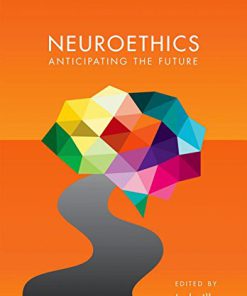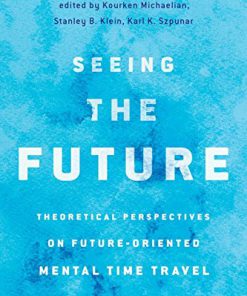Debates About Neuroethics Perspectives on Its Development Focus and Future 1st Edition by Eric 3319546511 9783319546513
$50.00 Original price was: $50.00.$25.00Current price is: $25.00.
Debates About Neuroethics Perspectives on Its Development Focus and Future 1st Edition by Eric Racine – Ebook Instant Download/Delivery ISBN(s): 3319546511, 9783319546513

Product details:
- ISBN 10: 3319546511
- ISBN 13: 9783319546513
- Author: Eric Racine
This is the first book entirely dedicated to exploring issues associated with the nature of neuroethics. It reflects on some of the underlying assumptions in neuroethics, and the implications of those assumptions with respect to training and education programs, research activities, policy engagement, public discourse, teaching, ethics consultation and mentoring, to name but a few areas of interest. Internationally respected and emerging leaders in the area have taken up the pen to express and debate their views about the development, focus and future of neuroethics. They share their analyses and make recommendations regarding how neuroscience could more effectively explore and tackle its philosophical, ethical, and societal implications.
Table of contents:
Part I: Development and History of Neuroethics
1: Section Introduction: Development and History of Neuroethics
References
2: Nudging Toward Neuroethics: Prehistory and Foundations
2.1 Introduction
2.2 Mapping the Brain
2.2.1 Electroencephalography
2.2.2 Electroconvulsive Therapy
2.3 The Silent Brain
2.3.1 Frontal Lobotomy
2.3.2 Persistent Coma: Henry Beecher and Pope Pius XII
2.3.3 The President’s Commission: Defining Death
2.4 The Brain in Living Motion
2.4.1 Brain Imaging
2.4.2 Phineas Gage and Brain Damage
2.5 Neuroethics
2.5.1 Whither Now?
References
3: The Evolution of Neuroethics
3.1 Introduction
3.2 Neuroimaging
3.2.1 Incidental Findings and Brain Privacy
3.2.2 Neuroimaging Limitations and Culpability
3.3 The New Psychosurgery
3.3.1 Informed Consent
3.3.2 Autonomy
3.4 Enhancement: Cognitive and Moral
3.4.1 Cognitive Enhancement
3.4.2 Moral Enhancement
3.5 Chronic Disorders of Consciousness
3.5.1 Diagnostic Criteria
3.5.2 Prognostic Uncertainty
3.6 Conclusion: Future Directions
References
4: Toward a Pragmatic Neuroethics in Theory and Practice
4.1 Introduction
4.2 Preludes and Prevention
4.3 Watershed Decisions
4.4 Apprehending Aphasia
4.5 Prognostication and the Uncertain Self
4.6 Preferences, Personal Identity, and Loss
4.7 Why the Disconnect Between Neuroethics and Clinical Ethics?
4.8 What Is to Be Done?
References
5: Born Free: The Theory and Practice of Neuroethical Exceptionalism
5.1 Introduction
5.2 A Future-Oriented Discipline
5.3 Neuroethical Exceptionalism
5.4 “The Idea That a Person Is His or Her Brain”
5.5 A Concluding Reflection
References
Part II: Focus, Theories, and Methodologies in Neuroethics
6: Section Introduction: Focus, Theories, and Methodologies in Neuroethics
References
7: Theoretical Framing of Neuroethics: The Need for a Conceptual Approach
7.1 Introduction
7.2 Neuroethics: Methods and Topics
7.2.1 Neuro-Bioethics
7.2.2 Empirical Neuroethics
7.2.3 Conceptual Neuroethics
7.3 Informed Materialism
7.3.1 Emotions
7.3.2 Neuronal Epigenesis and Epigenetic Proaction
7.4 Neuroethics of Brain Simulation
7.4.1 Why Does Neuroscience Need Brain Models and Simulations?
7.4.2 Neuro-Bioethics of Brain Modelling and Simulation
7.4.3 Fundamental Neuroethics of Brain Modelling and Simulation
References
8: Neuroethics: A Renewed View of Morality? Intentions and the Moral Point of View
8.1 Introduction
8.2 Intention, the Criterion of Action
8.3 Intention, the Prime Bearer of Responsibility
8.4 Empirical Confirmations
8.5 The Knobe Effect
8.6 A Dual Process Approach
8.7 The Death of Traditional Morality?
8.8 The Doctrine of Double Effect and Traditional Morality
References
9: Is It Time to Abandon the Strong Interpretation of the Dual-Process Model in Neuroethics?
9.1 Introduction
9.2 Is Consequentialist Judgment Based on Reasoning?
9.3 Is Moral Intuition Based on Emotion?
9.4 Are Deliberative Processes Less Error Prone Than Intuitive Processes?
References
10: Neuroethics and Policy at the National Security Interface: A Test Case for Neuroethics Theor
10.1 Introduction
10.2 Contemporary Neuroscience and National Security
10.2.1 Social Behavior Prediction
10.2.2 Behavior Modification
10.2.3 Capacity Extension
10.2.4 Neuroweapons
10.3 Unique Challenges
10.3.1 The Use of Force
10.3.2 Neuroscience and Warfighters
10.3.3 Post-ELSI Ethics
10.4 Neuroethics Theory and Methodology
References
Part III: The Future of Research Programs, Training, and International Neuroethics
11: Section Introduction: The Future of Research Programs, Training, and International Neuroethics
12: Models of Engagement in Neuroethics Programs: Past, Present, and Future
12.1 Introduction
12.2 Ethics Engagement Models Outside Neuroethics
12.2.1 Connecting Researchers with Public Values
12.2.1.1 Ethical, Legal, and Social Implications (ELSI)
12.2.1.2 Public Engagement
12.2.2 Connecting Researchers and Ethicists
12.2.2.1 Research Consultation Services
12.2.2.2 Collaborative Adjacency
12.2.3 Encouraging Reflective Research
12.2.3.1 Midstream Reflection (the Toolbox Project)
12.2.3.2 Midstream Modulation (STIR)
12.3 Ethics Engagement in Neuroscience
12.3.1 Neuroethics Engagement Programs
12.3.2 National Core for Neuroethics, UBC
12.3.3 Neuroethics Thrust, Center for Sensorimotor Neural Engineering, UW
12.3.4 Distinguishing Neuroethics Engagement and Plotting Neuroethics Development
12.4 Looking Ahead to the Future of Neuroethics Engagement
References
13: The Future of Neuroethics Research and Training
13.1 Introduction
13.2 The “Grand Challenge”
13.3 The Ethical Conduct of Research
13.3.1 Research on Neurodegenerative Disorders
13.4 Responsible Research and Innovation: Global, Social, and Moral
13.4.1 Global Values
13.4.2 Environmental Factors
13.4.3 Animal Research
13.4.4 Education and Training
13.5 Responsibility, Crime, and Punishment
13.6 The Identity of Neuroethics
References
14: Growing Up with Neuroethics: Challenges, Opportunities and Lessons from Being a Graduate St
14.1 Introduction
14.2 Same, Same but Different: Training at a Disciplinary Crossroads
14.3 Building a Knowledge Base at the Crossroads: A Team Effort
14.4 Baptisms by Fire: Practising Responsible Communication of Neuroethics Research
14.5 Toward a Neuroethics Specialty: All Grown Up?
References
15: Neuroethics Research in Europe
15.1 Introduction
15.2 Neuroethics Infrastructures in Europe
15.2.1 Neuroethics Institutions
15.2.2 Neuroethics Societies
15.2.3 Neuroethics Publication Platforms
15.3 Neuroethics Research
15.3.1 Neuroethics Research in Great Britain
15.3.2 Neuroethics Research in Germany
15.3.3 International Collaborations for Neuroethics Research
15.3.4 Ethical Research Within the Human Brain Project (HBP)
15.4 Neuroethics Research Training
15.4.1 Formal Academic Degree Programs
15.4.2 Conferences and Courses
References
16: Neuroethical Engagement on Interdisciplinary and International Scales
16.1 Neuroethics: Becoming a Discipline
16.2 Persons as Research Participants and Individual Subjects
16.3 Subjects as Relational
16.4 Research Neuroethics
16.5 Interrogative Neuroethics
16.6 Neuroethics Operating Across Discourses
16.7 Interoperable Neuroethics
16.8 Disciplined Neuroethics
References
17: The Biopolitics of Neuroethics
17.1 Introduction
17.2 Biopolitics
17.3 Identity of the Neuroethics Community
17.4 Building the Global Neuroethics Community
17.5 Creating Spaces of Neuro- and Biopolitical Scrutiny
17.6 Creating Spaces of Neuro- and Biopolitical Diversity
People also search:
neuroethics debate
neuroethics examples
ethics and neurodiversity
neuroscience debate topics
neuroethics the practical and the philosophical
You may also like…
Politics & Philosophy - Anthropology
Perspectives on French Colonial Madagascar 1st Edition by Eric Jennings 1137559678 9781137559678
Chemistry - Chemistry - General & Miscellaneous
The Periodic Table – Its Story And Its Significance 2th Edition Scerri Eric 0190914386 9780190914387
Politics & Philosophy
New Atheism Critical Perspectives and Contemporary Debates 1st Edition Christopher R. Cotter
Politics & Philosophy - Government & Politics
New Perspectives on Political Economy and Its History Maria Cristina Marcuzzo
Politics & Philosophy - Social Sciences
Science (General)












